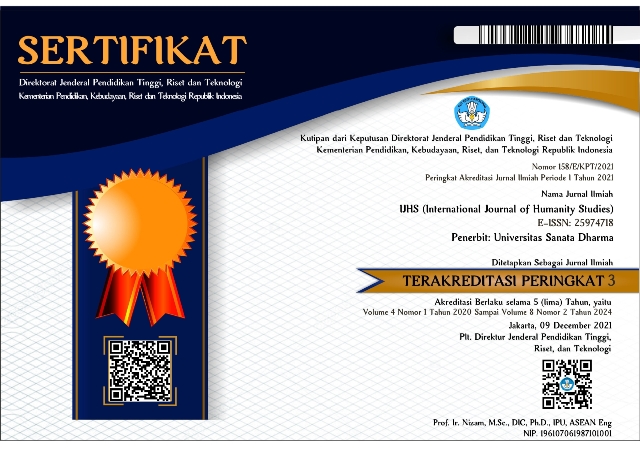THE PORTRAYAL OF AN AFGHAN WIFE IN NE SEIERSTADS THE BOOKSELLER OF KABUL: STYLISTIC ANALYSIS
(1) Sanata Dharma University
(*) Corresponding Author
Abstract
Keywords
Full Text:
PDFReferences
Andrews, A. (2016). (Re)Defining Afghan women characters as modern archetypes using Khaled Hosseini's a thousand splendid suns and asne seierstad's the bookseller of kabul. ProQuest LLC.
Beard, A. (2004). The language of literature. New York: Routledge.
Downing, A., & Locke, P. (2006). English grammar: A university course. London: Routledge.
Fontaine, L. (2013). Analysing English grammar: A systemic functional introduction. Cambridge: Cambridge University Press.
Halliday, M., & Matthiessen, M. (2004). An introduction to functional grammar. London: Horder Arnold.
Jeffries, L., & Mclntyre, D. (2010). Stylistics. Cambridge: Cambridge University Press.
Leech, G., & Short, M. (2007). Style in fiction: A linguistic introduction to English fictional prose. Harlow: Pearson.
Nguyen, T. H. (2012). Transitivity analysis of heroic mother by Hoa Pham. International journal of English linguistics, 2(4), 85-100.
Rahimi, W. M. (1991). Status of women: Afghanistan. Bangkok: UNESCO Principal Regional Office for Asia and the Pacific.
Ravassat, M., & Culpeper, J. (2011). Stylistics and Shakespeare's language: transdisiplinary approaches. New York: Continuum.
Seierstad, . (2004). The bookseller of Kabul. New York: Hachette Book Group.
Shah, S. K., Zahid, S., Shakir, A., & Rafique, S. (2014). Representation of women in Mann O Salwa: A case study through feminist stylistic analysis. Research on humanities and social sciences, 4(7), 90-105.
Shawa, W. (2015). Stylistics analysis of the poem To A Skylark by P.B. Shelley. IOSR journal of humanities and social science. 20(1), 124-137.
Song, Z. (2013). Transitivity analysis of a rose for Emily. Theory and practice in language studies, 3(12), 2291-2295.
Thompson, G. (2014). Introducing functional grammar (3ed). New York: Routledge.
Ufot, B. G. (2013). Phonology and stylistics: A phonoaesthic study of Grays Elegy Written in a Country Churchyard. English linguistics research, 2(2), 110-125.
Widdowson, H. G. (2013). Stylistics and the teaching of literature. New York: Routledge.
DOI: https://doi.org/10.24071/ijhs.v2i1.1523
Refbacks
- There are currently no refbacks.
Copyright (c) 2018 Arina Isti'anah
Indexed and abstracted in:
IJHS Sinta 3 Certificate (S3 = Level 3)
International Journal of Humanity Studies (IJHS) has been nationally accredited Sinta 3 by the Ministry of Education, Culture, Research and Technology of the Republic of Indonesia based on the decree No. Surat Keputusan 158/E/KPT/2021. Validity for 5 years: Vol 4 No 1, 2020 till Vol 8 No 2, 2024

This work is licensed under CC BY-SA.
Creative Commons Attribution-ShareAlike 4.0 International License.
p-ISSN: 2597-470X (since 31 August 2017); e-ISSN: 2597-4718 (since 31 August 2017)
Notice: The opinions expressed in this publication are those of the authors. They do not purport to reflect the opinions or views of the editorial team or publishers.
International Journal of Humanity Studies (IJHS) is a scientific journal in English published twice a year, namely in September and March, by Sanata Dharma University, Yogyakarta, Indonesia.

















